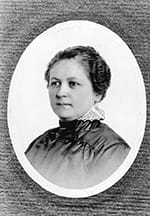 Coffee lovers can thank Melitta Bentz for her contribution into transforming the staple breakfast beverage from one that was bitter and full of grinds, to a grounds-free, aromatic hot drink. Bentz did this by creating what we now commonly refer to as the coffee filter and starting a business, which has operated for more than a century, to sell these and more. Early Years Melitta was born on January 31, 1873 in Dresden, Germany as Amalie Auguste Melitta Liebscher. Raised by a family of entrepreneurs and businessmen, Bentz grew up in an enterprising environment. Her father was a publisher and book salesman and her grandparents owned a brewery. Melitta fell in love with and married Johannes Emil Hugo Bentz. The couple went on to have two sons, Willy and Horst, in 1899 and 1904, respectively, and one daughter, Herta in 1911. Innovating at Home In the early 1900s, coffee was a household staple. By pouring hot water over a cloth bag, or via an espresso-like machine, the popular breakfast drink was made. However, at the turn of the 20th century, both of these practices frequently left grounds of coffee in the drink. Despite metal filtering devices available at the time, Melitta still found her coffee full of grinds and bitter. Determined to have a cup of Joe without the grinds, Melitta began experimenting. She perforated a brass cup with nails and then used blotting paper from Willy’s school book to line the cup. The result? A simple fix to create less bitter, more fragrant coffee—grounds-free. Building a Business Melitta’s grounds-free coffee was well received by those she shared it with, which led her to set up her own company. On June 20, 1908, the Imperial Patent Office granted Melitta a patent for her filter. Later that year, in December, her company, M. Bentz, was entered into the commercial register and Melitta was officially in business. Melitta’s first employees were none other than her own husband and sons. In 1909, just a year after Melitta began her company, she sold 1,200 filters at the Leipzig Fair. The following year, in 1910, her business was awarded a gold medal at the International Health Exhibition. And, over the years, the awards kept on coming. Melitta’s company continued to grow and moved to several different locations in Dresden to accommodate for expansions. By 1929, she had produced 100,000 filters. In the same year, the company’s headquarters was moved to Minden in Westphalia. Melitta made sure her employees were always well cared for, and she even set Melitta Aid, a social fund for her workers. In 1930, Horst took over running the business, but Melitta continued to have a presence in the business. In 1932, the company is renamed Melitta-Werke AG. Later Years During World War II, the company was ordered to make goods for the war, but in 1948, the production of coffee filters began again. In 1950 at 77 years old, Melitta passed away, but her spirit of innovation and the brand she created lived on. During the year of her death, the company was worth 4.7 million Deutsche Marks. Today the Melitta Group KG has grown to include 50 companies, more than 3,000 employees and is still in the family, controlled by Melitta’s grandsons, Thomas and Stephen Bentz.
0 Comments
Your comment will be posted after it is approved.
Leave a Reply. |
Archives
July 2017
Categories
All
|
 RSS Feed
RSS Feed